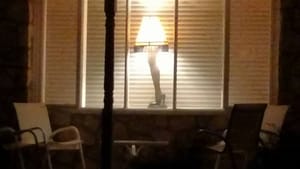Stay in the Loop
BSR publishes on a weekly schedule, with an email newsletter every Wednesday and Thursday morning. There’s no paywall, and subscribing is always free.
The Great American Christmas Story
Jean Shepherd: An appreciation

“Hey, kid!”
The young boy playing in the front yard of my neighbor’s house turned just as King Louie lifted his terrier leg on the ninth hydrant of the past 20 minutes. Nothing came out, but that’s beside the point; Louie is as much about the salute as anything else when he’s taking his evening constitutional.
“Hey, kid, what’s with that lamp?”
“What, the leg?” I could tell from the tone of his voice that the soft glow of electric sex gleaming in the window left him completely unimpressed.
“Yeah, that.”
“That’s my dad’s.”
“Gee, it doesn’t look like his leg.”
No response. This kid’s quite the conversationalist, I thought. He’ll probably wind up working deep in the bowels of some monolithic government agency someday. I continued baiting him.
“No, I meant what’s the deal with the leg? What is it, some kind of Christmas decoration?”
“Beats me. Hey, can I pet your dog?”
He’ll learn about the leg
I let him give King Louie a small treat, said my goodbye, and trudged home. “Beats me”? He clearly hasn’t learned yet, but he will. Another year, two at the most, and he’ll know all about that leg. He’ll find out why he shouldn’t lick a flagpole in winter. He’ll meet Ralphie and Randy, Flick and Schwartz, Grover Dill, Scut Farkus and Miss Shields.
And if he’s lucky, he’ll learn how they — and so many others — originated from the fertile mind of Jean Shepherd.
I got home, poured myself a black Russian (sorry, Lebowski, dairy and alcohol just don’t mix), and thought about how Shep (who died in 1999 at the age of 78) was so much more than his contributions to the iconic 1983 movie, A Christmas Story.
As an American humorist and storyteller, Shep is right up there with Will Rogers and Garrison Keillor. Jerry Seinfeld has said that Shep “really formed my entire comedic sensibility.” Jerry probably grew up like me, listening to Shep dispense nightly wisdom on WOR radio in New York.
Yep, radio. Long before anyone was concerned about putting their eyes out, Shep cut his late-night teeth right here in Philadelphia on KYW from 1951 to 1953. He wound up at WOR in New York City three years later and remained a fixture there until 1977.
Bringing it full circle
It’s difficult for anyone who hasn’t listened to Shep’s radio program to appreciate his uncanny ability to start a story, travel a fascinatingly complex and intellectually engaging path of tangent upon tangent, then bring it all full circle 45 minutes later while Eduard Strauss’s “Bahn Frei Polka” signals the end of another show.
Listening to Shep was connecting to someone on the inside, a guy who knew all the ropes, a fellow traveler through life who appreciated how absurd so much of it is — and, more importantly, knew why and was willing to share the reasons. It was a heady mix of commiseration and education, and there was nothing like it anywhere else on the dial.
Or on the printed page. Shep wrote seven books (including the prank novel, I Libertine, as described in this post over on hoaxes.org), the two best of which were collections of short stories, many of which originally appeared in Playboy.
In God We Trust: All Others Pay Cash was first published in 1966. “Duel in the Snow, or Red Ryder Nails the Cleveland Street Kid” serves as the core of A Christmas Story. It originally appeared in the December 1965 issue of Playboy as “Red Ryder Nails the Hammond Kid” and was described in the magazine’s “Playbill” introduction as “the definitive treatise on kiddy Christmases past.” Hef was sure right about that.
Some of the most memorable scenes in A Christmas Story come from other stories in the book. "The Counterfeit Secret Circle Member Gets the Message, or The Asp Strikes Again" (later published in Playboy’s April 1969 issue) tells the tale of the Little Orphan Annie decoder ring, while "My Old Man and the Lascivious Special Award That Heralded the Birth of Pop Art," another story that appeared for the first time in In God We Trust, is all about that major award.
Those sonsabitchen Bumpus hounds
Wanda Hickey’s Night of Golden Memories: And Other Disasters is the second of Shep’s best books. “The Grandstand Passion Play of Delbert and the Bumpus Hounds” does for Easter what Red Ryder does for Christmas, and those sonsabitchen Bumpus hounds that devoured the turkey in the movie take on a ham in the original story.
Shep’s magazine work extended beyond Playboy: He had a monthly column in Car & Driver and even wrote for MAD back when it was ridiculously awesome; issue #32, cover-dated April 1957, included “The Night People vs. Creeping Meatballism.” Tom Lehrer and Orson Bean, among others, were contributors to that issue. Those were the days.
Shep released four record albums (one was of him reading the poems of Robert Service) and did an enormous amount of work for television. Jean Shepherd’s America was one of PBS’s high points in 1985; the 13-part series was described by the New York Times as “not much like anything else on public television — or network television either, for that matter.”
I took a deep draw from my glass of black Russian. Yeah, that kid will learn soon enough, and hopefully he’ll dig a lot deeper than just the movie. Because as great as A Christmas Story is, there’s so much more Shep to enjoy.
Maybe he’ll even go all in and subscribe to the Shep-A-Day podcast. Now there’s an idea. I think I’ll download a few episodes onto my iPod. King Louie looks like he needs another walk.
For Naomi Orwin’s review of the musical version of A Christmas Story currently playing at the Walnut Street Theatre, click here.
Sign up for our newsletter
All of the week's new articles, all in one place. Sign up for the free weekly BSR newsletters, and don't miss a conversation.

 Craig Peters
Craig Peters